The Best Simpsons Episodes of the ’00s
The Simpson moved from rebel rousing subversive antiheroes to personal story tellers from season 12 through season 22.

After the surprising rise and appallingly steady excellence of The Simpsons’ first decade, many long-time supporters felt the show would have gone out on top if it ended around 2001-2002. The late 1990s era was hit with a traumatic loss with the death of comic genius Phil Hartman. After a pay dispute, voice actress Maggie Roswell left from 1999 to 2002, resulting in the death of the Maude Flanders in the episode “Alone Again, Natura-Diddily.” But the first cracks in the series’ “Golden Age” appeared when Principal Skinner was redacted and retrofitted for “The Principal and the Pauper,” from season 9. It was seen as a major copout.
With Beavis and Butt-Head amping up cartoons on MTV, Fox had a new dangerous animated show on the block, Family Guy. But with every breakthrough, South Park would point out how “The Simpsons already did it.” Knowing this, The Simpsons softened the sharp-edged animation (moving from cel animation to digital ink and paint), fleshed out the characters, and let the jokes indulge irreverent self-reference, and the occasional social relevance. The comedy became more personal, shedding the slapstick of Homer and Bart to focus on Marge and Lisa. Not that this was less dangerous, the season 13 episode “Blame It on Lisa,” almost got the show sued by the Rio de Janeiro tourist board in one of the biggest controversies of the long-controversial franchise.
The show had internal issues as well, like an April 2004 work stoppage when the actors learned how much Fox was making on syndication and DVD sales The writers of The Simpsons went on strike together with the Writers Guild of America at the end of 2007. Season 19 was delayed because of contract negotiations, shortening the planned 22-episode season to 20 installments. Just in time for the show’s twentieth anniversary, the United States Postal Service unveiled a series of five different 44 cent stamps, each designed by show co-creator Matt Groening.
In the midst of the decade, the family moved to the big screen, borrowing panels from Stephen King’s Under The Dome and Mr. Burns sinister plan to shield Springfield from the sun for a cinematic and merchandising extravaganza. The Simpsons Movie was made alongside the 2007 season. It opened at the top of the box office with a $74 million premiere weekend, and set the record for highest grossing opening weekend for a film based on a television series. For those who thought the show should have ended, this was a major testament to its continued popularity.
The Simpsons ended the decade as a new standard bearer. It beat Gunsmoke‘s record as the longest-running American primetime, scripted television series when it entered season 21 in late 2009. Here are 10 episodes which kept it loaded.
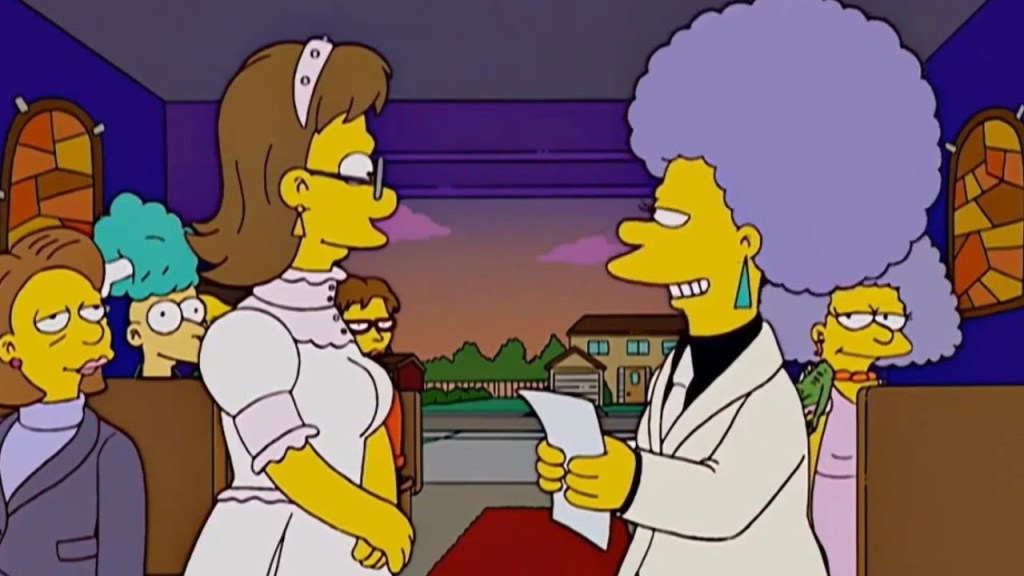
10. There’s Something About Marrying
Season 16 Episode 10 – Feb. 20, 2005
Written by J. Stewart Burns. Directed by Nancy Kruse.
Fox’s publicity team announced a major character would come out as gay long in advance of the airing of “There’s Something About Marrying.” While most speculation centered on Mr. Burns’ sycophantic sidekick Waylon Smithers, it turns out to be Homer’s sister-in-law Patty. As surprise factors go, Homer nails it when he drops another bomb, “I like beer.” Marge, America’s greatest enabler, is also in the deepest denial, not noticing the tell-tale signs only a montage could display. Marge wore pearls as a child, Patty liked hardhats. Marge crushed on David Cassidy; Patty had eyes for Miss Hathaway from The Beverly Hillbillies. And then there was that Sleepless in Seattle incident, which now keeps Marge up nights.
After Bart pranks a famously ever-smiling tourist to frown for the cameras on his way out of the shamefully ill-mannered Springfield, Mayor Quimby accepts Lisa’s idea to win back tourism by allowing same-sex marriages. At the time, this was only legal in Massachusetts. Reverend Lovejoy refuses, but Homer trades his “Death before gay marriage!” sign for a minister’s license ordained by the Internet.
“There’s Something About Marrying” is prescient, but complicated. Marge feels shocked and betrayed, not supportive and familial. Springfield legalizes same-sex marriage for money, not progression, which may be cynical, but remains a persistent concern. The reveal that Patty’s girlfriend Veronica isn’t a woman, and the entire notion of man sneaking into women’s tournaments, plays into reactionary politics, as does the ever-evolving marriage applicants who line up to get married at the end. The Simpsons were timely, and the episode captures a wide range of conflicted cultural responses.
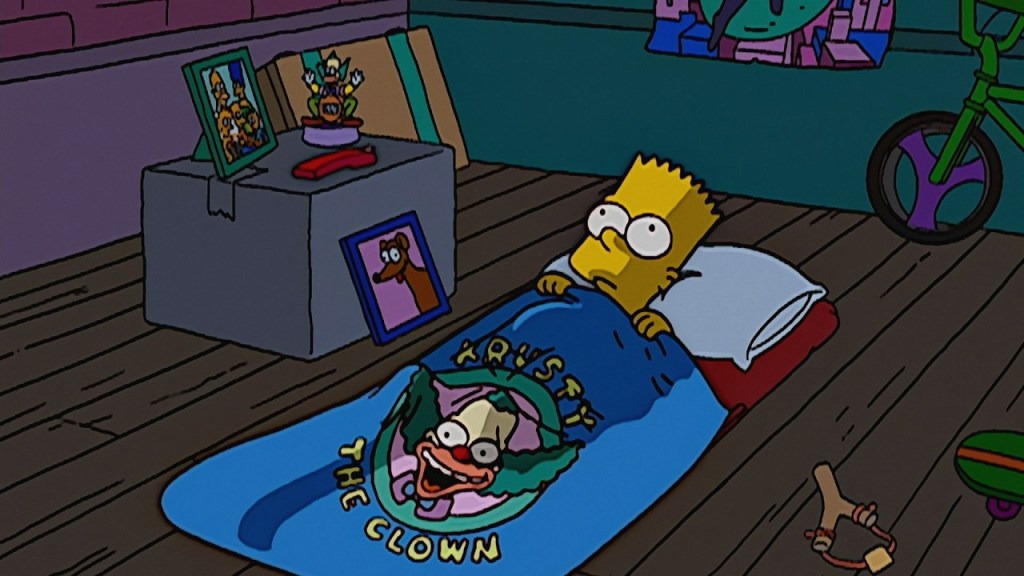
9. Barting Over
Season 14 Episode 11 – Feb. 16, 2003
Written by Andrew Kreisberg. Directed by Matthew Nastuk.
Homer was going to tell Bart about the “Baby Stink Breath” ads the boy made as an infant. He was just waiting until his death bed. This is because “Barting Over” is one of the most callous entries in The Simpsons canon. Not only does Homer capitalize on his baby booster, making a public spectacle of the effluvium of his every exhale, but loses the money buying back incriminating pictures of a baby drop at a hotel room. It’s no wonder Bart emancipates himself from the family.
For The Simpsons’ 300th episode, Bart and Lisa make a revealing discovery: a videotape marked “BART SAD” in a box of old video tapes, it translates into “Bart’s Ad” when it plays a bad breath baby solution commercial starring an infant Bart. With no college fund or investments to show for it, and aided by Homer’s courtroom tirades, Judge Harm grants Bart emancipation, even though he is only 10 years old. That’s cold. He also gets half of Homer’s wages, which heats things up a bit. Marge gets a sewing room.
The episode comes together with the cameo appearances. While blink-182 infuses a rhythmic thrust, Tony Hawk blows it away in a skateboarding contest. “You’re going down, Homer,” the legendary skateboarder warns. “Then back up. Then down, then back up again. That’s how the game is played.” He ultimately loses to Homer’s magic skateboard. It’s a bit of a copout ending, But it fits because of the serious cynicism of the episode. At least Homer finds a way to make some kind of financial amends, agreeing to give Bart the money he makes from Viagra-Gain, promoting hair growth and erectile dysfunction. “Possible side effects include loss of scalp or penis.”
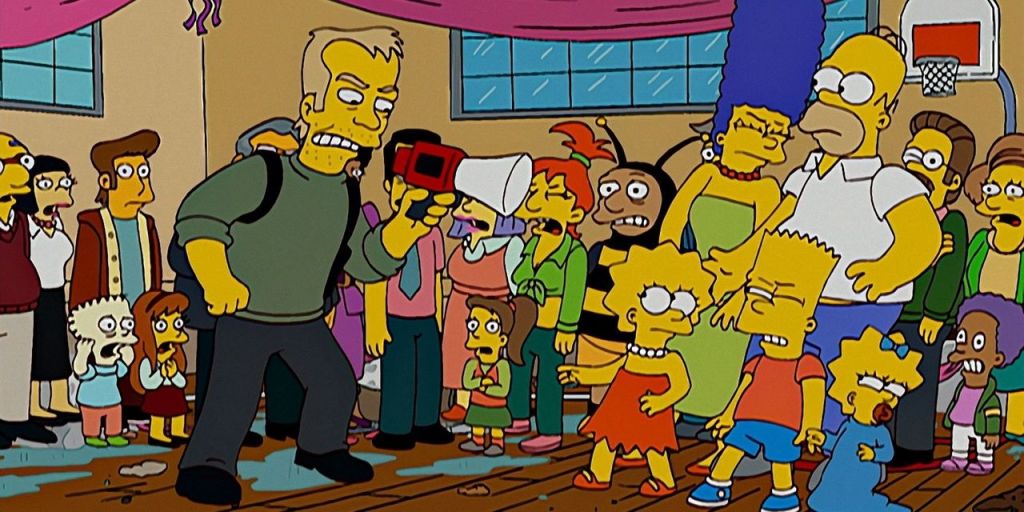
8. 24 Minutes
Season 18 Episode 21 – May 20, 2007
Written by Ian Maxtone-Graham and Billy Kimball. Directed by Raymond S. Persi.
“24 Minutes” parodies the format of 24, giving Bart and Lisa less than the episode’s half hour run to stop school bullies from setting off a stink bomb at the Springfield Elementary School bake sale. As a spoof, and as the 399th installment of The Simpsons, it hits all the right spots: the troubled but effective secret agent, a mole on the inside crying on the outside, a cell phone in every hand, split screens whether they are needed or not, and of course, Jack Bauer. Yes, Kiefer Sutherland voices the role long enough to fall for one of Bart’s prank calls, and calls in an entire division for backup. Is it worth it? He swears he’d give the order again.
In his war on classroom misbehavior, Springfield Elementary Principal Skinner forms the CTU: “Counter Truancy Unit.” Operatives Milhouse, Martin, and Database have top clearance, classified as “dork, dink and dingus.” The episode doesn’t open with a cloud of an angelic choir, but a “previously on” segment to remind us Jimbo, Dolph, and Kearney are missing, and presumed to be up to no good. The clock is ticking, Marge only has 27 minutes to make a cake for the school bake sale.
“This is our life now, we’re dumpster folk,” Homer tells Milhouse after blowing his cover. The stakes stay high during the entire episode, and every character in Springfield is perfectly placed. Bart spends quality time captive in detention, but brings in the big guns when a very special kid, Ralph Wiggum, goes down. The mole is revealed to be Martin, who can’t live with the guilt of betraying the fine standards of the CTU, and makes the ultimate sacrifice, a self-inflicted wedgie.

7. Eternal Moonshine of The Simpson Mind
Season 19 Episode 9 – Dec. 16, 2007
Written by J. Stewart Burns. Directed by Chuck Sheetz.
Asking Abe Simpson about memories is like letting a horse do your taxes, which worked in 1998. The Simpsons proved they were able to break new ground in this emotionally warped parody adaptation. With a title inspired by Charlie Kaufman and Michel Gondry’s 2004 film Eternal Sunshine of the Spotless Mind, the episode is open to endless possibilities.
In “Eternal Moonshine of The Simpson Mind,” Homer wakes up after a bender with lots of clues, but no recollection of the night before. This is because he’s ordered the most memorable drink to be had at Moe’s Tavern since the Flaming Moe. Moe’s Forget-Me-Shot is a mix of triple sec, quadruple sec, the red stripe from Aquafresh, and the venom of the Louisiana Lobotomoth. When it kicks in the drinker checks out, and when Homer wakes up, his family has done the same.
To help reconstruct what happened, Homer goes to Dr. Frink, working at the Memory Recovery Institute, which does not do MRIs. Homer remembers Marge getting a black eye, but can’t imagine himself doing something so horrible, even after uncovering a vague passing idea of her having an affair with Duffman. The audience is left guessing until the very end. The episode gives Homer a full emotional portrayal, with exquisite moments of growth. The episode is also filled with great individual gags, double entendres, and the segment about Homer’s lifelong relationship with beer is an all-time classic high.
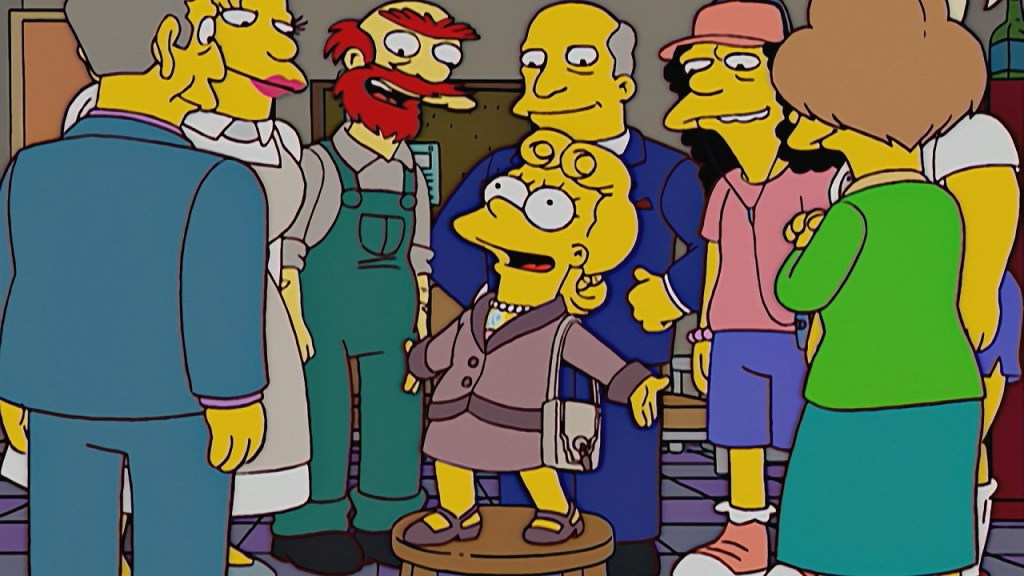
6. The President Wore Pearls
Season 15 Episode 3 – Nov. 16, 2003
Written by Dana Gould. Directed by Mike B. Anderson.
The Simpsons’ musical parodies are on par with their film spoofs, but come with the extra added burst of song. Lisa’s rise to student body president rivals Evita Perrone’s in Andrew Lloyd Webber’s Broadway opera Evita. But don’t cry for Argentina, Fairfield Elementary School is a political blackboard jungle. “Professional buttinsky” Michael Moore even warns Kent Brockman the school’s striking students are on their way to being chronically unemployable except in his movies.
Every song is perfectly pitched to undermine the score, which is being kept by Principal Skinner and Superintendent Chalmers. They groom Lisa’s rebellious spirit for tyrannical control, scheming to turn a sacrificial goat into the teachers’ pet with small tastes of power, like access to the faculty lounge, where Groundskeeper Willie holds court with jokes about Milhouse’s T-shirt tucking.
“The President Wore Pearls” is as perfect an episode as The Simpsons have produced. Each member of the family, school, and administration are showcased in magnificently-matched musical mode. Even Nelson gets to strut his “Ironman.” It works best as a character study in miniature. Lisa’s perpetual struggle to do the right thing is eroded by the corruption of the job, and the episode is a deep delve into the most compulsively ethical character of the show. Certainly, the most compulsive.
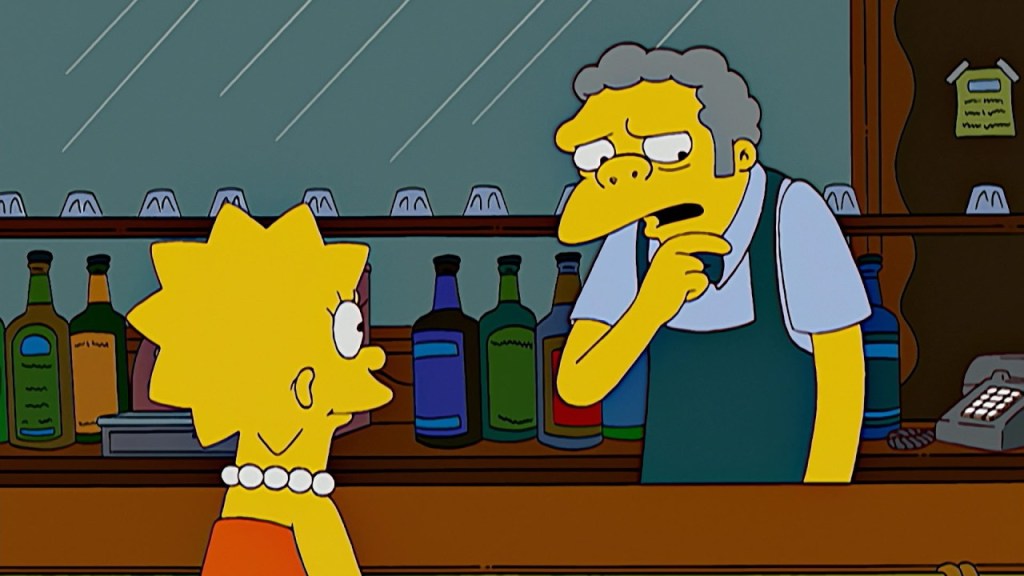
5 Moe ‘N’ a Lisa
Season 18 Episode 6 – Nov. 19, 2006
Written by Matt Warburton. Directed by Mark Kirkland.
To begin with, “Moe ‘N’ a Lisa” is a “a terrific title,” as Moe would exclaim in the episode. “It jumps out at you like a rat out of your underwear drawer.” It’s brain-goo like that which brings tears to the eyes of poetry-loving Lisa, who sees in Homer’s favorite barman a budding Charles Bukowski. Moe doesn’t need the tapes of sycophantic laughter guest voice Gore Vidal carries around with him, and he doesn’t use as many exclamation points as Tom Wolfe!! The pain, the despair, the agony of Moe’s dirty-bar-rag existence are wrung out in anguished humanity, splashing misery on anyone within earshot.
Homer may fall all over himself, as well as several stories of fire escapes, in his celebration of Moe’s poetic soul, with the “fluttering wings, teatime in Buttercup Junction” accolades, and admits the “princess of Lollypopland” has a gift, but no one feels the pain like Lisa. She takes every torn scrap of Moeism as a pearl of unvarnished truth, and puts them together in verse, freely. “My soul smells like a dead pigeon after three weeks. I shut my window and go to sleep. In my dream I eat corn with my eyes,” reads his first work, “Howling at a Concrete Moon.” But when Moe’s caustic cacophony is deemed cut-and-paste hackery by the critics at the Wordloaf writing festival in Vermont, Lisa gets glued with the glory.
What makes the installment so special is how Lisa truly sees beauty in the angry tirades of a bitter man with a sweet core. Moe’s background is an endless reservoir of toxic wastewater, but Lisa’s reflection in it brings depth to its darkest stagnation. Also featuring Michael Chabon and Jonathan Franzen, the episode is a literary treat, as well as a lowbrow trick.
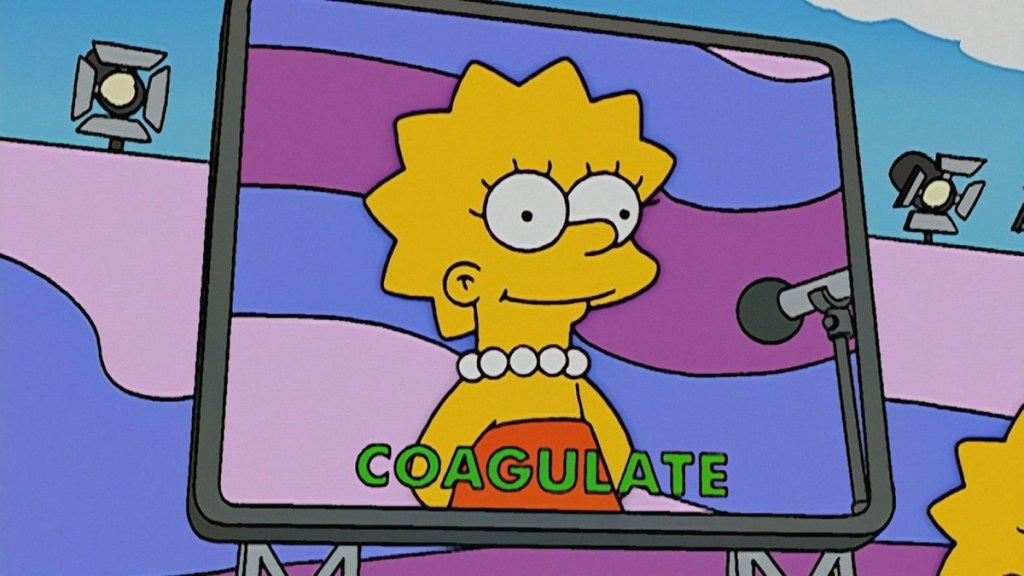
4. I’m Spelling as Fast as I Can
Season 14 Episode 12 – Feb. 16, 2003
Written by Kevin Curran. Directed by Nancy Kruse.
“I’m Spelling as Fast as I Can” is one of the few episodes which works even though it has competing story lines. Lisa’s mercurial rise through the world of competitive spelling bees, and Homer’s Deadhead devotion to the Krusty Burger limited-time-only special, the Ribwich, currently touring around the country.
Lisa wins a Springfield Elementary spelling bee in which Superintendent Chalmers consistently finds ways to demean Principal Skinner every chance he is asked to use a word in a sentence (“Nothing can ameliorate the ineptitude of Principal Skinner”). The win makes Lisa eligible for the Spell-ympics competition, which is being sued by the Olympics for use of the suffix “lympics.”
The entire town rallies behind the young spelling sensation. In a loving nod to Rocky Balboa’s run through Philadelphia in Rocky, Lisa is quizzed by encouraging passersby, only missing the lightning bolt in the spelling of the band AC/DC. The middle Simpson child finds confidence, respect, and ambition on the road to phonetic fame in the statewide contest, but as guest voice George Plimpton, playing the head of the Spell-ympics, asks: Can you spell rigged?
The Ribwich is also rigged. Ingeniously classified as “food,” containing “authentic, letter-graded meat,” and “now without lettuce,” the fix is in for flavor. “I don’t mind the taste,” Krusty endorses, and Homer finds love at the very first drool of barbecue sauce. His culinary epiphany comes in a Requiem for a Dream parody, and ends with a full conversion. “I have eaten the ribs of God,” Homer declares. “It’s not just a sandwich. It’s about brotherhood, it’s about freedom, it’s about three days since I’ve had one. I’m getting the shakes. Oh, and I’m getting the fries!”
But in the end, his family means more than any seasonal sandwich. Though he has abandoned his daughter in her time of great deeds, Homer finally shows up at the at the Spell-ympics, yelling “Daddy made it for your dance recital, honey.” Lisa finds the courage she needs to mistakenly misspell the last word, which would have gotten her a full scholarship to any of the Seven Sisters colleges had she agreed to misspell it on purpose.
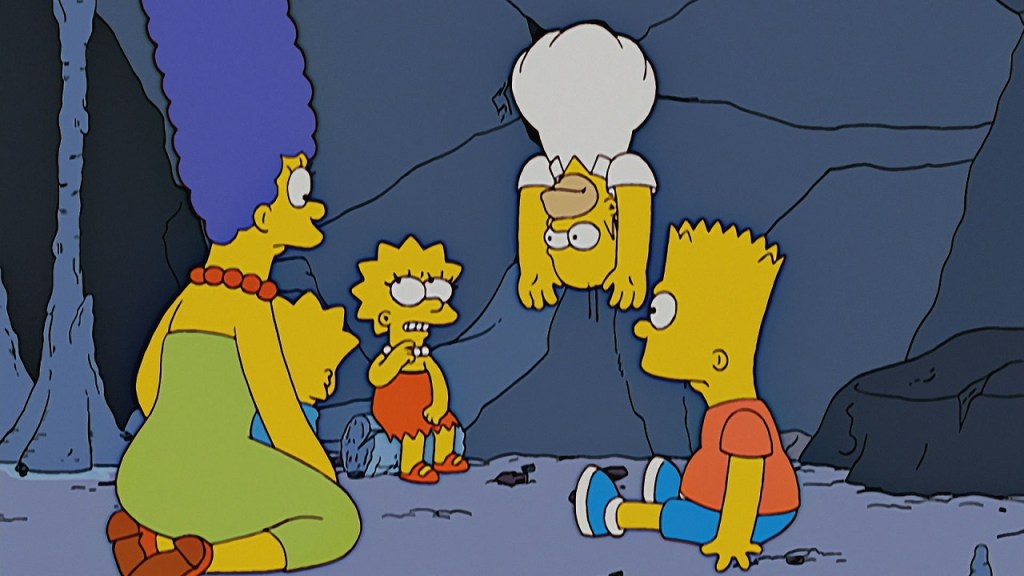
3. The Seemingly Never-Ending Story
Season 17 Episode 13 – March 12, 2006
Written by Ian Maxtone-Graham. Directed by Raymond S. Persi.
The Emmy-winning episode “The Seemingly Never-Ending Story” hides a story inside a story, a bag of gold in a cave, and enough origin tales to qualify as a hastily buried treasure. It begins with a Simpsons family nature walk. When Homer tries to get a souvenir piece of stalactite from the Carl’s Dad Caverns, he causes a cave-in his body won’t fit through. While Marge, Bart, and Maggie search for help, Lisa passes the time recounting the lesser-known side of Springfield. Like Mr. Burns’ tale of woe and heartache when his wealth and power were yanked from his grasp in a scavenger hunt with Rich Texan (refereed by Commander McBragg from The Adventures of Rocky & Bullwinkle), and his hands were filled with drudge work.
“I had to get a job, and I had to start at the bottom,” Mr. Burns had told Lisa after an incident left them hiding from a ram who chased them into the attic of Burns Mansion. “But to get to the bottom, I had to work my way up from Moe’s.” The most depressing watering hole in Springfield is really the deepest pit of despair in the entire area, including neighboring Shelbyville, but it hides an even bleaker underside, beneath the jar of pickled onions that sits at the side of the bar. The jar also covers the tragic end of a lost love. Moe was the happiest guy in the world when he first started dating the then-new teacher in town, Edna Krabapple, but fate likes to play a little game called “Up Yours, Moe.”
Unsealing fate brings Snake’s backstory up from under a rock. In his youth, he was an archaeologist, with promise and ideals. During an expedition, he discovers an ancient stash of Mayan coins, and is excited to donate them to the perfect museum, but runs into a love-struck Moe who is grappling with an awful dilemma: “Should I rob this guy or rob him and kill him?” His ultimate choice sets Snake on a lifelong path to take revenge on society, by which he means robbing convenience stores. In the end, of course, it is Marge who saves the souls almost lost to murderous greed, and Moe who brings a baseball bat to a gunfight.
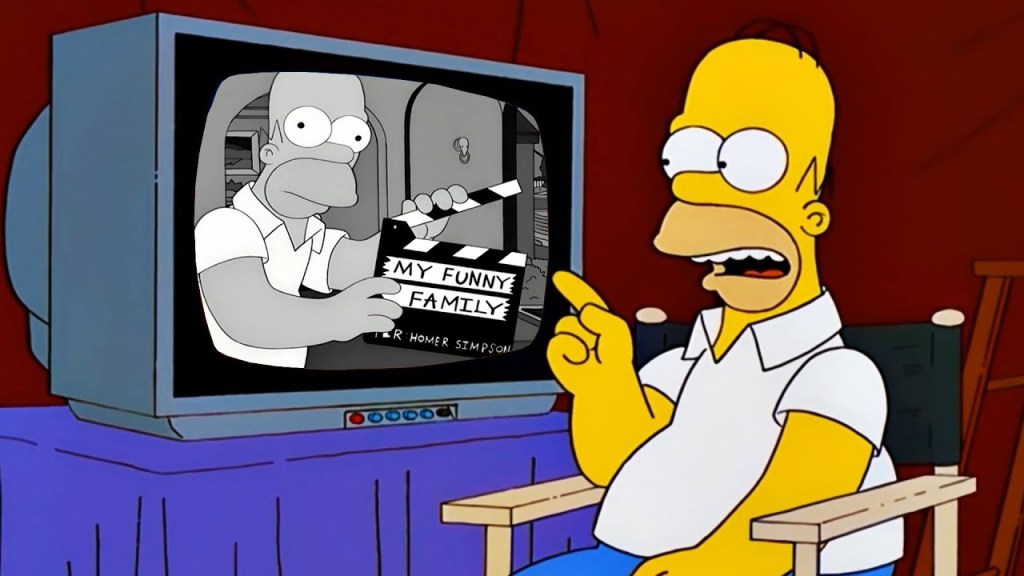
2. Behind the Laughter
Season 11 Episode 22 – May 21, 2000
Written by Tim Long, George Meyer, Mike Scully, and Matt Selman. Directed by Mark Kirkland.
Many people firmly believe “Behind the Laughter,” the last episode of season 11, marks the end of The Simpsons “Golden Era,” and it is fashioned by holes in the remnants of former glory. Formatted like VH1’s Behind the Music, with their narrator Jim Forbes calling the shots, the installment exposes the cast for what they really are when the animators aren’t controlling their every move. We learn what the Simpson family were like before they became famous, and the personal demons which fame conjured along the way.
The first act parodies the rise of The Simpsons’ popularity, along with the merchandising, T-shirt-friendly catchphrases, hit singles, and product endorsements. They are portrayed as a regular family which struck it rich because Marge’s hairdresser happened to be president of Fox, which reluctantly airs a pilot written and directed by Homer. The family appears to be nothing like their dysfunctional on-screen counterparts.
“I want to set the record straight. I thought the cop was a prostitute,” we hear, among other juicy tidbits of behavior so reckless it could have its own volume in the “Encyclopedia Self-Destructica.” Homer gets hooked on prescription painkillers after injuring himself during the Springfield Gorge stunt from “Bart the Daredevil.” Marge loses the family fortune on bad licensing choices. Bart has a drunken mid-air collision with some flight attendants, and is replaced by Richie Rich while in rehab. The IRS repossesses the theme park Homertime for unpaid taxes. Ultimately, it is the now-tax-savvy legend Willie Nelson who saves the day, the family, the series, and any residual credit due.
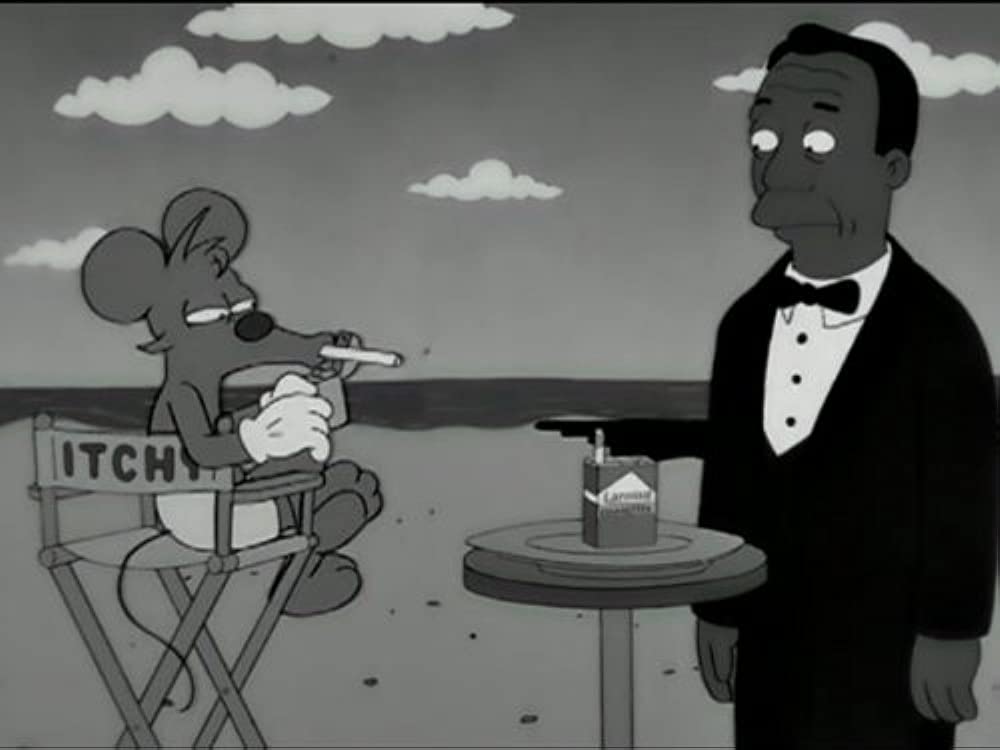
1. HOMR
Season 12 Episode 9 – Jan. 7, 2001
Written by Al Jean. Directed by Mike B. Anderson.
“HOMR” may be the smrtest, and sweetest episode in the entire run of The Simpsons. It takes the deepest dive, and not just up the nose, but into the relationship between Homer and Lisa, allowing them to meet on equal intellectual footing, which bonds them emotionally, and leads to an ultimate family sacrifice. Along the way, Homer happens to accidentally disprove the existence of God while working on a flat tax proposal.
“Animation is so great,” Homer enthusiastically opens the episode. “It’s way better than whatever the alternative is.” The head of the Simpson family is a known quantity as an unknowing entity, getting by on coincidence, luck, and a cartoonish ability to reanimate. His resiliency is never more apparent than when a failed cartoon investment venture loses the family’s savings, and he sells himself off as a medical guinea pig for cash. The researchers learn Homer’s IQ is stunted by a crayon in his brain, leftover from a childhood miscalculation on just how many could fit up his nose. As contradictory as this sounds, Homer was not stupid before his cranial Crayola mishap.
After the offending crayon, whose hue shall not be shamed here, gets extracted, Homer is a changed man, but not only his intelligence. Homer’s entire perspective opens, he is more productive at work, and more attentive at home, especially with Lisa. The two have always been distanced by intelligence, but also perception. When Lisa asks Homer if he’d read all the books in view, he says “everything from Death Be Not Proud to Hop on Pop.” She and the audience are impressed. But when Homer agonizes over how sad it was then they hopped on Pop, it reveals far more of the true character, and the relationship. The increased IQ proves to be too much for Homer’s coworkers, and friends at Moe’s Tavern.
Poignant and satiric, “HOMR” won the Emmy for Outstanding Animated Program, and the hearts of Simpsons fans and casual watchers alike. What it’s done to the sale of crayons is not known.
You can read our list of The Best Simpsons Episodes of the ‘90s here. Stay tuned for our list of The Best Simpsons Episodes of the ‘10s.
